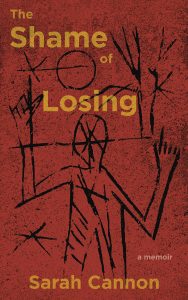Review by Christine Stewart-Nuñez
The Shame of Losing, Sarah Cannon’s debut memoir, opens with her reaction to horrifying news: an accident at work has left her husband, Matt, clinging to life. The twin arcs of Matt’s physical recovery and the dissolution of their marriage follows. This book leaves readers with a profound sense of how one second can change the life of a family forever.
I found a lot to admire in Cannon’s work. The hospital scenes, that show her reacting to the news of Matt’s traumatic brain injury, which happens just days before his 33rd birthday, gripped me. Cannon does an excellent job evoking the terror and confusion of those early weeks, which she accomplishes through good description and style. Here, clipped sentences reflect the tension and upheaval of the scene:
A ring of blood lined his ear and fresh drips leaked from his eyes. They talked about brain bleed. They talked about subdural hematoma. They talked about blunt force trauma. I didn’t know what any of it meant. …. I couldn’t see what the professionals saw: a skull crumpled, a blown-out eye, busted eye sockets, and a collapsed nose. (12)
Passages such as this one transported me into the hospital, my body viscerally reacting. Eager to know to how Matt would survive, I read on, unable to put the book down until a narrative break.
Cannon organizes the book on a linear trajectory from Matt’s hospitalization and ongoing recovery, with the challenges recovery entailed. Her use of journal entries and letters, strategically placed, speaks to her consciousness as a writer even as she grappled with trauma. These gave readers different versions of Cannon’s voice—the letters to Matt more descriptive and sad, the journal entries penned in the hospital full of the anger, worry, and boredom. Two entries, written just hours apart, juxtapose the “waiting for the next test” play-by-play rhythms of a hospital stay with anger Cannon directs toward an anesthesiologist for the way she accomplishes a spinal tap. Although this “raw data” gave me additional insights to Cannon’s inner life, I wondered why she didn’t use them as scenes on their own—why they needed to be journal entries at all.
The Shame of Losing honors the contemporary work of memoir—truth telling. I was impressed with Cannon’s frankness about the impact of what other characters said. In one passage, she describes how her daughter’s teacher reached out to her. He asked, “as childlike as the kids he managed every morning, ‘Aren’t you wondering why me, why now?’ I didn’t have the heart of conscience or wherewithal to say yes or no. What he was getting at was a sense of awe only outsiders have the privilege of feeling” (61). Without direct experience, we don’t often get beyond platitudes; Cannon’s comment about the sense of awe gave me pause as I reflected on my own outsider privileges.
Cannon understands how past informs the present. At the beginning of the book, I was intrigued with how Matt’s father died young and the subsequent effect it had on Matt—plus how it shadowed Matt’s accident. I also thought the flashbacks about Sarah and Matt’s courtship set a strong foundation for her fears when the accident happened. So when Matt comes home and the marriage falls apart—the last thirty-two pages of the book—I was stunned. I appreciated Cannon’s honesty—“I didn’t tell Matt about my transgression. I simply stopped talking to him about much of anything at all. I didn’t neglect the children or my work, but I neglected him (134)”—but few scenes actually show this, nor are there enough that show Matt’s changing feelings. Intellectually, I understood that the traumatic brain injury changed Matt, and that Sarah struggled with being married to a changed man. Yet I wanted to see this happening, not just be told that it did.
What I will remember most about The Shame of Losing is the ways life can change for a wife after a spouse sustains a traumatic brain injury. I felt frustrated for Sarah—the work she did advocating for Matt’s workplace compensation, helping him find a job he could do, and piecing a life back together—goes under-appreciated by everyone. This is the behind-the-scenes work of life that memoir has the power to reveal—insight that I will take with me as I move throughout my life.
The Shame of Losing: A Memoir by Sarah Cannon
Red Hen Press, 2018, $16.95 ISBN: 978159709-624
Read Sarah Cannon’s Author’s Note on writing The Shame of Losing.
Christine Stewart-Nuñez, essayist and author of four poetry collections, is a professor in the English Department at South Dakota State University. Find her work at christinestewartnunez.com.


